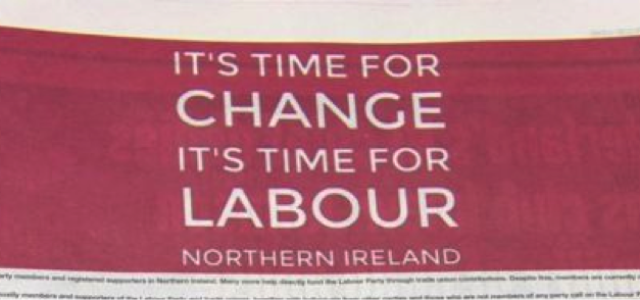Cillian McGrattan
Labour is one of the largest parties in Northern Ireland. Since May 2015 its membership has tripled to around 1,000 members. In comparison, the membership of the largest party in terms of seat share, the Democratic Unionist Party (DUP), is 900.
Despite this unprecedented upsurge in membership – and despite collecting membership moneys from all concerned – the local party is prohibited from standing in elections by the ruling National Executive Committee (NEC). At its recent annual general meeting, however, the local party voted to field candidates ‘at the earliest date at which it is appropriate to do so’. To all intents and purposes, this will be the May 2016 Northern Ireland Assembly election.
Historic Divisions
The prohibition on Labour Northern Ireland contesting elections is long standing and relates to an overlapping, self-reproducing and intersecting range of party and peace process politics. As Ed Miliband explained in 2012:
the most important thing a British government can be is an honest broker. It is very hard to be an honest broker if you are also an electoral participant.
In the meantime, UKIP has (arguably) added to the plurality of Northern Irish politics by targeting ‘natural’ Labour voters. Some politicians have defected to the right wing party, which arguably also draws upon the alienation with local politics in the region, which has seen turnout drop to around 52%.
Miliband’s point about being an ‘honest broker’ is important because it draws in a variety of complicated party political questions. For instance, if Labour (UK) stands does this mean that the Irish Labour Party must also field candidates, leading to a three-way split between with the Northern Irish nationalist Social Democratic and Labour Party (SDLP)?
The SDLP, itself, has, in the past, lobbied against Labour extending membership rights to the people of Northern Ireland and stated that a decision by the Great British party to contest elections would be considered a ‘hostile act’ against a social democratic ‘sister party’ that would compound the SDLP’s difficulties in relation to Sinn Fein, thereby creating imbalance in the peace process.
Against this backdrop, Labour Northern Ireland has instituted legal proceedings on discrimination grounds against its parent party. As a result of which, in 2003, it won the significant concession of extension of membership to Northern Ireland and in 2008 it was constituted as a Constituency Labour Party.
A Question of Rights or Participation?
The Northern Irish branch has continued to campaign vociferously against the stance of Labour and the SDLP. In 2013, for example, it complained that an NEC decision not to field candidates amounted to a ‘suppression of our democratic right to vote Labour’, that was, it continued, ‘based on opposition from other parties … The SDLP is being kept on “life support” at the cost of our democratic rights’.
It is at this point in the argument that confusion can enter: despite being an anti-abortion party, the SDLP is still socialist, as one (male) commentator argued on the Northern Irish political blog Slugger O’Toole, simply because it can always change policy and break with Catholic, conservative social teaching. In other words, the socialist sorority is not based on women’s rights.
The confusion extends beyond (at best) havering over rights to indulgence of the threat that the peace process depends on the SDLP (which according to a recent leaked party document will continue its slump to its worst ever performance in next May’s Assembly elections). The 1998 Agreement is soon coming of age: next year will mark its 18th anniversary – that such arguments are still given credence testifies to the resilience of a culture of political bullying in Northern Ireland, that the agreement, the SDLP and Labour ought to be above.
This leads to what is, arguably, the most fundamental level of confusion in the whole debate over Labour contesting elections: namely, the elision of party and constitutional politics.
The 1998 and the subsequent 2007 St Andrews Agreements made clear that the constitutional issue was effectively parked and that political parties could designate as ‘Other’ on the border question: they did not have to be either nationalist or unionist.
It is for that reason that Miliband was wrong: Labour can be an ‘honest broker’, but only if it embraces the murky world of electoral contestation.
In other words, the paradox the party faces in a Northern Irish political culture that is declining in plurality and liberalism – and in which the two main Northern Irish parties (the DUP and Sinn Féin) have signed up to an austerity agenda – is that by refusing to sanction the contestation of elections it is simply not possible to remain neutral: Labour’s stance of remaining an ‘honest broker’ by refusing to sanction electoral participation means that it is in fact complicit in the reproduction of many of the sentiments that leave Northern Ireland resigned to remaining a place apart.
Cillian McGrattan is Lecturer in Politics at the University of Ulster. He is the author of Memory, Politics and Identity: Haunted by History (Palgrave Macmillan, 2012)
